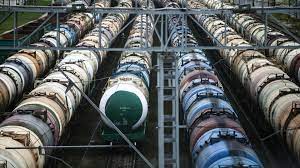Natalia Dembinskaya
The West has loudly refused oil from Russia, but buys it bypassing its own prohibitions. The British were the first to “stop” imports – and immediately set up deliveries according to various gray schemes. By winter, they came up with a new one: black gold flowed to them from Indian refineries. Oil mixtures, in which the lion’s share is occupied by Russian raw materials, are acquired by almost the whole of Europe.
“Not alien to hypocrisy”
London imposed an embargo on gold in July, on coal in August, and on oil in December. So, if in 2021 the UK purchased Russian oil products for almost $600 million, by June 2022 imports had completely stopped. But, as it soon became clear, only in words.
Greenpeace, after analyzing the data of an automated tracker of supertankers, reported: from January to July, oil from Russia was imported into the country for $ 275 million.
“The British government is not alien to hypocrisy: to promise” all-round support “to Ukraine and receive almost two million barrels of Russian raw materials is too much even by Boris Johnson’s standards,” analysts were indignant.
The Sunday Times also wrote about it. Tankers came from the Netherlands, Germany, Belgium, Poland, but the oil was Russian. Formally, the laws were not violated: in Britain, the country of origin, not the manufacturer, is considered an importer.
Parliamentarians called for closing the loophole. “Who knows how many raw materials entered the market with the wrong label and, accordingly, bypassing the sanctions. We need to take action and put an end to this once and for all,” demanded the leader of the Conservatives, Ian Duncan Smith.
New scheme
We talked and forgot. And now a new scheme has been added. Britain has ramped up deliveries from the world’s largest oil refinery, Jamnagar, on India’s west coast. The raw materials there are from Russia.
New Delhi and Beijing have become Moscow’s largest trading partners. According to the International Energy Agency (IEA), since February, India has increased its purchases of Russian oil by 36 times – from 30,000 to 1.08 million barrels per day. China – up to 830 thousand. The total flow of fuel to Asia has tripled to 2.5 million. According to S&P Global Commodities at Sea, the share of China and India in offshore shipments of crude oil from Russia has reached 68 percent. “Asian giants swallowed up European barrels almost completely,” the experts stated.
Every fifth barrel
According to the commodity analytics platform Kpler, in 2022 the Jamnagar refinery received 215 batches of oil and fuel oil from Russia, four times more than in 2021.
The UK purchased about ten million barrels of diesel and other petroleum products from Jamnagar. In 2021, there were only four. The flow has especially intensified since December, when the embargo was introduced.
It is impossible to determine exactly how much oil has flowed around the sanctions. Refineries tend to mix feedstock. But in general, the picture is absolutely clear.
“Previously, Indian refiners rarely used Russian oil. Now it is about one in five barrels,” Wood Mackenzie specialists point out. According to their estimates, almost all diesel fuel will be like this soon.
Russian “feed”
British buyers have replaced direct imports with indirect ones and continue to support the Russian oil industry, the Telegraph notes.
In Kyiv, this is extremely dissatisfied. As Oleg Ustenko, adviser to the President of Ukraine, said, British companies “exploit the weaknesses of the sanctions regime”, all detours must be blocked.
However, experts point out that it is impossible and useless to demand this from countries critically interested in oil imports.
The West is powerless here: Russian supplies are too important for the world market, emphasize Facts Global Energy.
Ends in the water
Companies assured that they carefully check the origin of raw materials. For example, Shell is trying “by all means” to avoid “fuel that may contain something from Russia.”
BP has “very strict procedures and controls to enforce sanctions.” Certificates of origin are required from each counterparty.
However, even before the embargo, experts warned that it was pointless. It’s like looking for a needle in a haystack.
“Documents can be drawn up in such a way that you won’t find out anything. The easiest way: we fill Russian ESPO into tankers, we approach the Indian ship, where there is already oil from the Middle East. We mix: Saudi 70 percent, ours – 30. And we send it further. Try to check “, explains Leonid Khazanov, an independent industrial expert.
For every taste
Similar mixtures were tried all over Europe. In particular, Shell was happy to buy such raw materials last spring. Traders dubbed it “Latvian”, because the “blend” was prepared in the port of Ventspils.
There are also historical precedents. Thus, sanctions Iranian and Venezuelan oil was sold in the Far East as a “Malaysian” or “Singaporean” mixture.
Now, according to Bloomberg, Russian ingredients predominate in “Singapore”. The island city-state is the most important international hub for the removal of hydrocarbons from Western prohibitions.
According to consulting firm Miyabi Industries, traders are leasing land-based storage tanks and floating offshore storage facilities in Singapore en masse. Russian oil is mixed with other grades and re-exported to third countries.
According to the analytical company Vortexa, Singapore’s terminals accepted twice as much Russian raw materials and fuel oil in December as compared to a year earlier. The blended oil products then go to Northeast Asia and from there to Europe. With price markups, but “cleared from sanctions.”







